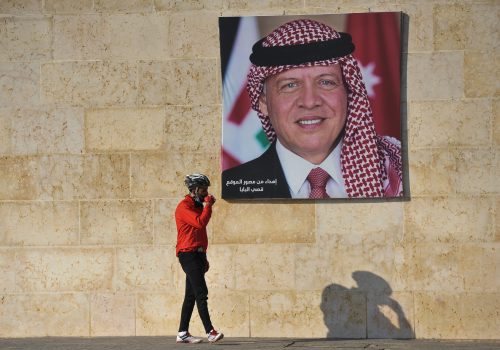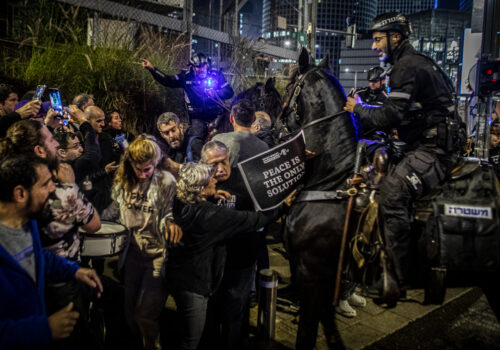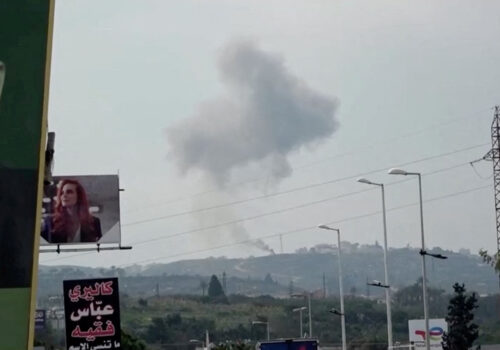Jordan was already walking a tightrope. Then the Gaza war happened.
Even before October 7, 2023, Jordanian authorities faced considerable pressure. Unemployment across the Hashemite Kingdom had climbed to approximately 22 percent. An Arab Barometer poll showed that 63 percent of Jordanians between the ages of 18–29 were considering emigrating due to economic woes, a higher percentage than nearly insolvent Lebanon and conflict-ridden Iraq. On the political front, King Abdullah accused his half-brother Prince Hamzah in 2021 of launching a “seditious” plot with former Royal Court Chief Bassem Awadallah. As punishment, Jordanian authorities placed Hamzah under house arrest. In a bid to quell popular discontent, the Jordanian monarch launched a political reform initiative that same year. Yet, activists saw few signs of democratic progress. In 2023, Freedom House labeled the Hashemite Kingdom “Not Free,” its lowest ranking, as Abdullah dominated Jordan’s political system with the power to appoint prime ministers, senators, and military leaders.
The Gaza war only added more stress on the Jordanian government. The Hashemite Kingdom witnessed a significant drop in tourism during the fall of 2023, further damaging a weak economy. Given that approximately 50–60 percent of the Hashemite Kingdom’s population—including Queen Rania—is of Palestinian origin, it is no surprise that Jordanians voiced their opposition to Israel’s military campaign in Gaza. A University of Jordan poll found that 66 percent of Jordanians supported the October 7, 2023, Hamas assault that killed about 1,200 Israelis. As the Gaza death toll spiked, Jordanians hit the streets to highlight their outrage. On October 20, 2023, Reuters reported that thousands of Jordanians chanted in Amman, “Oh Hamas, hit them with Qassam rockets…bring the suicide bombers to Tel Aviv.”
SIGN UP FOR THIS WEEK IN THE MIDEAST NEWSLETTER
Jordanian authorities were not pleased with the large protests. Amnesty International noted that at least one thousand people were arrested in Amman during pro-Palestinian demonstrations in October and November 2023. Jordanian security forces said some of those arrested during the protests engaged in arson. At the same time, activists cited public criticism of the Hashemite Kingdom’s stance on Gaza as the genuine reason for the detentions. After Jordanian authorities cracked down on 2020 demonstrations in support of teachers’ pay, it was no surprise that the government felt certain protests about Gaza were also threatening.
Public opinion pushes boundaries
Even as security forces detained activists in Amman, the royal family and Jordanian government understood the need to better align themselves with public opinion by intensifying their criticism of Israel. Queen Rania has given numerous interviews in which she assailed Western leaders for not condemning Israel’s killing of Palestinian civilians. Abdullah took the lead in voicing opposition to cutting funds for the United Nations Relief and Works Agency for Palestine Refugees in the Near East (UNRWA). The king also participated in a February military airdrop of medical supplies to Gaza. Donning a military uniform, the Hashemite leader flew in a Jordanian Air Force helicopter and helped provide humanitarian goods for the besieged enclave. Jordan later collaborated with the US military to drop food packages to Gazans.
On November 1, 2023, Jordan withdrew its ambassador from Tel Aviv and instructed the Israeli ambassador to Amman not to return until the Gaza war ended. Then on November 16, 2023, after thousands of Palestinians had been killed in Gaza, Foreign Minister Ayman Safadi announced that the Hashemite Kingdom would not proceed with a water-for-energy deal with Israel and the United Arab Emirates (UAE). The country’s top diplomat insisted that Israel had no right to self-defense as an occupying power.
In response, the Israeli foreign ministry expressed regret for the Hashemite Kingdom’s “inflammatory” remarks but emphasized that the neighboring countries’ ties are of “strategic importance.” That very month, Jordanian Prime Minister Bisher Khasawneh also warned that any Israeli attempt to transfer Palestinians in the West Bank to Jordan would be considered a “declaration of war.” Yet, some six months later, Jordan has avoided military clashes with Israel, in contrast to neighboring Lebanon and Syria.
Still, it’s worth noting that Jordanian-Israeli ties were chilly even before the Gaza war.
In January 2023, the Jordanian foreign ministry repeatedly summoned Israel’s ambassador to Amman for reprimands over Benjamin Netanyahu’s government policy at the al-Aqsa Mosque compound. When Netanyahu was out of office, Amman still refused to participate in the “Negev Summit,” a 2022 meeting between Israel, Egypt, Bahrain, Morocco, and the UAE. From 2000–2005, Jordan also left its ambassador post in Tel Aviv empty to protest Israeli military operations during the Second Intifada. Despite numerous instances of pushback since October 7, 2023, this was not enough for the Jordanian public.
Protestors deplore Jordan’s balancing act
Around six months into the war, many Jordanians have not been satisfied with their government’s response to the Gaza war. During late March, thousands of Jordanians demonstrated in Amman on a nightly basis, with some trying to storm the Israeli embassy. “Our protests will continue until the war on Gaza comes to an end,” asserted Jordanian activist Mohammed al-Abssi. The large resurgence of protestors demonstrated the increased disconnect between the public and government officials. Activists in Amman held signs with pictures of Hamas military spokesman Abu Obaida, even as Abdullah expelled Hamas officials from the kingdom after assuming power, with authorities later accusing the Palestinian militant group of illegally smuggling weapons into Jordanian territory.
Despite this pressure, King Abdullah has declined to take more drastic steps. While activists have demanded that Jordan sever all ties with Israel, the Hashemite leader refused to cancel the landmark 1994 peace treaty and has proceeded with the multibillion-dollar gas deal with Israel signed in 2016. In March, Jerusalem-based Kan 11 television reported that the Hashemite Kingdom asked Israel to extend a water agreement for an additional year as Amman continues to suffer from severe water shortages. The kingdom has also forcibly dispersed hundreds of Jordanians trying to march along the country’s border with the West Bank.
The king’s measured stance on the Gaza conflict also extended into Amman’s ties with Washington. In a rare move, the Jordanian government canceled President Joe Biden’s planned October 18, 2023, meeting in Amman, with Safadi saying that such a summit would be ill-advised while the United States would not agree to end the Gaza war. Nonetheless, Abdullah proceeded with a February visit to Washington even as the Biden administration continued to support Israel’s military campaign. The Hashemite monarch was the first Arab leader to sit with Biden at the White House after the Gaza war erupted and press for an immediate ceasefire. Abdullah understood that refusing to meet the US president was not a sustainable policy, and instead felt it would be more effective to promote a pro-Palestinian viewpoint directly with Israel’s top ally. While Jordanian protestors criticized the United States for its support of Israel, Washington pushed to keep bilateral ties with Amman on track. Biden praised the Hashemite leader for his “critical leadership” in increasing Gaza aid and pledged “unwavering” US support for Jordan.
Jordan’s delicate balancing act in response to the Gaza war stems from its need to maintain cordial ties with the United States. As Washington provides the cash-strapped Jordan with about $1.5 billion in annual aid, the Biden administration remains the Hashemite Kingdom’s largest donor. If Abdullah were to annul his peace accord with Israel as some protestors demand, he would likely face congressional threats of a cut in the kingdom’s massive annual assistance package. Washington has already demonstrated its willingness to suspend aid to UNRWA and the Palestinian Authority. Therefore, Jordan would be unwise to ignore the precedent by pro-Israel US lawmakers and risk losing such critical bilateral assistance.
Abdullah’s relatively moderate response to the Gaza war has only reinforced his importance to Washington. Whether Jordan’s cooperation on airdrops of Gaza humanitarian aid or its participation in the anti-Islamic State of Iraq and al-Sham (ISIS) coalition, US officials can count on Amman to be a reliable partner during regional crises. By rebuffing protestors’ calls to support Hamas, the king demonstrated his willingness to sacrifice domestic popularity to cement his alliance with the Biden administration. Such flexibility helps ensure that Abdullah will continue to be a regular White House visitor, far beyond the current Middle East conflict.
Aaron Magid is the host of the podcast, On Jordan. A former Amman-based journalist, his articles on the Hashemite Kingdom have appeared in Foreign Affairs, Foreign Policy, and Al-Monitor. Follow him on X: @AaronMagid.
Further reading
Wed, Jan 4, 2023
Jordanians are protesting again. It’s time for economic and administrative reforms.
MENASource By Laith Alajlouni
Without tackling the root causes of Jordan’s issues, the country will only delay the crisis and it will snowball into something larger in the future.
Wed, Mar 6, 2024
Netanyahu might be losing ground, but his politics still resonate with most Israelis
MENASource By Ksenia Svetlova
Polls show that the Israeli public is torn on many issues, but trust in Netanyahu’s government is not one of them.
Fri, Mar 1, 2024
As fighting along the Lebanon-Israel border escalates, diplomats scramble to head off a war
MENASource By Nicholas Blanford
The chances of calming the Lebanon-Israel border will be that much greater if a temporary ceasefire in Gaza evolves into a permanent ceasefire.
Image: Demonstrators carry banners and flags as a flare burns during a protest in support of Palestinians in Gaza, amid the ongoing conflict between Israel and the Palestinian Islamist group Hamas, outside Al Kalouti mosque near the Israeli embassy in Amman, Jordan, March 27, 2024. REUTERS/Alaa Al-Sukhni



